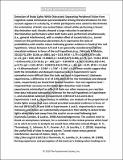Detection of brake lights while distracted: Separating peripheral vision from cognitive load
Author(s)
Wolfe, Benjamin A; Sawyer, Benjamin D; Kosovicheva, Anna; Reimer, Bryan; Rosenholtz, Ruth Ellen
Download13414_2019_1795_ReferencePDF.pdf (1.572Mb)
Publisher Policy
Publisher Policy
Article is made available in accordance with the publisher's policy and may be subject to US copyright law. Please refer to the publisher's site for terms of use.
Terms of use
Metadata
Show full item recordAbstract
Drivers rarely focus exclusively on driving, even with the best of intentions. They are distracted by passengers, navigation systems, smartphones, and driver assistance systems. Driving itself requires performing simultaneous tasks, including lane keeping, looking for signs, and avoiding pedestrians. The dangers of multitasking while driving, and efforts to combat it, often focus on the distraction itself, rather than on how a distracting task can change what the driver can perceive. Critically, some distracting tasks require the driver to look away from the road, which forces the driver to use peripheral vision to detect driving-relevant events. As a consequence, both looking away and being distracted may degrade driving performance. To assess the relative contributions of these factors, we conducted a laboratory experiment in which we separately varied cognitive load and point of gaze. Subjects performed a visual 0-back or 1-back task at one of four fixation locations superimposed on a real-world driving video, while simultaneously monitoring for brake lights in their lane of travel. Subjects were able to detect brake lights in all conditions, but once the eccentricity of the brake lights increased, they responded more slowly and missed more braking events. However, our cognitive load manipulation had minimal effects on detection performance, reaction times, or miss rates for brake lights. These results suggest that, for tasks that require the driver to look off-road, the decrements observed may be due to the need to use peripheral vision to monitor the road, rather than due to the distraction itself.
Date issued
2019-06Department
Massachusetts Institute of Technology. Computer Science and Artificial Intelligence Laboratory; Massachusetts Institute of Technology. Department of Brain and Cognitive Sciences; Massachusetts Institute of Technology. Center for Transportation & Logistics; AgeLab (Massachusetts Institute of Technology)Journal
Attention, Perception, & Psychophysics
Publisher
Springer Science and Business Media LLC
Citation
Wolfe, Benjamin et al. "Detection of brake lights while distracted: Separating peripheral vision from cognitive load." Attention, Perception, & Psychophysics 81, 8 (June 2019): 2798–2813 © 2019 The Psychonomic Society, Inc.
Version: Author's final manuscript
ISSN
1943-3921
1943-393X